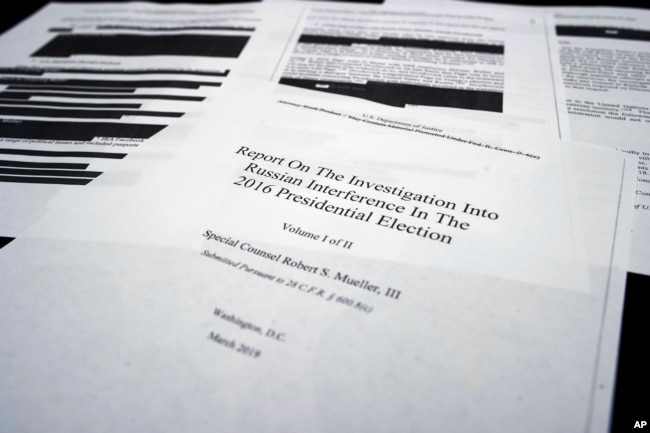
House Committee Votes to Hold Attorney General in Contempt
FILE – Attorney General William Barr is sworn in to testify before the Senate Judiciary Committee hearing on Capitol Hill in Washington, May 1, 2019, on the Mueller Report.
VOA News
VOA’s Patsy Widakuswara and Masood Farivar contributed to this report.
CAPITOL HILL — The U.S. House Judiciary Committee has voted to hold Attorney General William Barr in contempt of Congress over the Justice Department’s refusal to provide an unredacted copy of special counsel Robert Mueller’s report on his investigation of Russian election interference.
The committee voted 24-16, along party lines, to hold Barr in contempt. When asked earlier in the day about timing of full House vote, Majority Leader Steny Hoyer said it had not been scheduled.
Before the vote was held Wednesday, the White House said President Donald Trump has “no other option than to make a protective assertion of executive privilege” over the materials the committee asked for in its subpoena, because of what Press Secretary Sarah Sanders called a “blatant abuse of power” by committee chairman Rep. Jerrold Nadler, a New York Democrat.
“The American people see through Chairman (Jerrold) Nadler’s desperate ploy to distract from the president’s historically successful agenda and our booming economy. Neither the White House nor Attorney General Barr will comply with Chairman Nadler’s unlawful and reckless demands,” Sanders said in a statement.
Unable to resolve dispute
Committee leaders and Justice Department officials had met Tuesday to try to resolve their dispute, but the two sides each issued statements late in the day indicating they remained far apart.
The Justice Department’s positions came in the form of a letter to Nadler from Assistant Attorney General Stephen Boyd, who accused Nadler’s committee of making “unreasonable demands” and provoking “an unnecessary conflict between our respective branches of government.”
Boyd said the Justice Department had acted within the law and regulations by offering a copy of the Mueller report “with as few redactions as possible,” but said committee leaders escalated the dispute by demanding all committee members be allowed to review that version, something he said would “risk violating court orders” in some ongoing cases.
Nadler in his statement said the White House had long ago waived its executive privilege over the materials requested in the subpoena, which include not only the full Mueller report but also the underlying documents from the investigation of Russia’s interference with the 2016 election, whether members of Trump’s campaign colluded with Russia, and whether the president obstructed justice.
He said the administration’s refusal to provide the information places the country in a “constitutional crisis.”
“It’s an attack on the essence of our democracy,” Nadler said.
Now that the Democrat-controlled Judiciary Committee has approved the contempt citation for the attorney general, it would be taken up by the full House of Representatives. In theory, someone held in contempt could eventually be tried and, if convicted, face up to a year in prison. The Justice Department rarely pursues such referrals from Congress.
Two options
However, if the measure passes the full House, House Democrats will have two options to force Barr into compliance.
The speaker of the House can ask the U.S. attorney for the District of Columbia to bring criminal charges against Barr for failure to comply with a congressional subpoena. But that is an unlikely outcome and not only because the U.S. attorney reports to Barr.
That leaves House Democrats with their second option: to ask a federal judge to authorize the release of the full Mueller report. Democrats have said they intend to pursue that option, but the process can be lengthy.
Historically, Congress has only rarely issued contempt citations for non-compliance of its subpoenas, according to Congressional Research Service.
Four times since 2008, the House has held an administration official in contempt of Congress for failure to comply with a subpoena for information.
In each of those cases, the Justice Department decided not to pursue criminal charges. In three of those cases, however, Congress eventually obtained through civil lawsuits much of the information it was seeking, according to CRS.
Nadler’s committee is also considering whether to hold Donald McGahn, the former White House counsel, in contempt of Congress if he refuses to testify before the committee later this month about the Mueller probe.
Refusing to comply
McGahn on Tuesday refused to comply with a subpoena for documents related to the investigation. The White House had demanded he ignore the subpoena, and his lawyer said the documents were property of the White House and as such McGahn had no right to them.
Barr last month released a redacted copy of the Mueller report, with the prosecutor concluding neither Trump nor his campaign colluded with Russia, but reached no conclusion whether Trump, as president, obstructed justice during the 22-month investigation. Barr decided the findings did not warrant obstruction charges against the president.

In an online statement under the name DOJ Alumni, more than 700 former federal prosecutors, so far, who worked in Republican and Democratic administrations said evidence Mueller uncovered would have resulted in obstruction charges against Trump, were it not for the long-standing Justice Department policy that a sitting president cannot be charged with a criminal offense.
House Majority Leader Hoyer said efforts to obtain information from the Trump administration would likely take time and should not be tied to the political considerations of the upcoming 2020 presidential election.
“This is a very fundamental issue. So if it takes a year and a half, that’s a relatively short period of time in the course of the history of our country,” Hoyer told reporters in a briefing Wednesday morning. “How our democracy effectively represents the American people and prevents a dictator or authoritarian figure to impose his or her will individually on the rest of us.”
But congressional Republicans say the process is entirely political.
“I’m fairly certain President Trump couldn’t eat a cheese sandwich without some Democrat crying treason,” Senator John Thune, the majority whip said on the Senate floor.
Rep. Doug Collins, the ranking member on House Judiciary told VOA, Democrats’ efforts are a distraction.
“They’re wanting it to appear more than what it is. They’re wanting to paint the attorney general as the bad guy because they want to paint the attorney general as someone people can’t trust,” Collins said. “Why? Because they don’t like the findings. They don’t like what came out of the Mueller report.”

